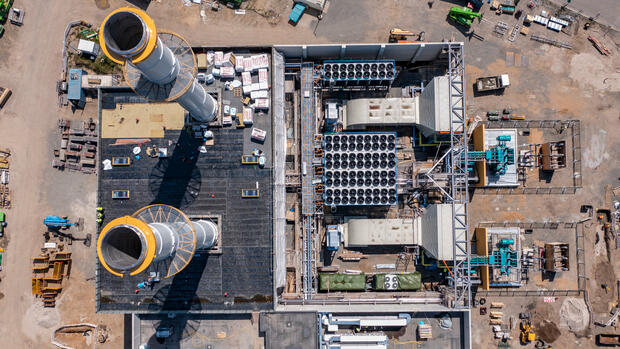Industry does not want to wait for hydrogen to become available and is proposing other approaches.
(Photo: dpa)
Berlin The manufacturers of gas turbines have doubts that the operation of their plants with climate-neutral hydrogen, as desired by politicians, will be possible in the next few years.
They assume that the hydrogen is not available at all. That is why they are calling for the operation of gas-fired power plants in combination with the separation and storage of CO2 (Carbon Capture and Storage, CCS for short) to be made possible.
GE, one of the world’s leading manufacturers of gas turbines, is propagating this solution: “Perhaps hydrogen-capable back-up gas power plants, the construction of which the Federal Ministry of Economics wants to incentivize, will not run on climate-neutral hydrogen because the fuel will initially be scarce,” says Benjamin Winter von GE.
There are various reasons for this: “On the one hand, there are strict requirements for green hydrogen in Europe, on the other hand, the hydrogen infrastructure must first be built. At the same time, the hydrogen demand of sectors such as steel, chemicals and cement will increase sharply in the next few years,” says Winter.
The unilateral obligation of the manufacturers to develop hydrogen-capable gas turbines, although the completion of the infrastructure, especially in southern Germany, will take years, is “difficult to understand”.
CCS as an alternative to hydrogen
CCS or CO2 separation in combination with the use of CO2 (Carbon Capture and Utilization, CCU for short) represent “a quick and efficient solution for reducing CO2 emissions from gas-fired power plants,” says Winter. The methods are tried and tested and immediately available. “Politics should therefore open up the possibility of using CCS and CCU technology in the energy sector,” he demands.
Siemens Energy, one of the largest gas turbine manufacturers in the world alongside GE, takes a similar view, but points out a problem: “Capturing and storing CO2 is fundamentally possible, but involves high investments. This can only be economically worthwhile if the power plants are running at full capacity,” says a spokesman for Siemens Energy.
New power plants are indispensable as a back-up solution
There is no question that new gas-fired power plants are needed. In the future, they will always be used when the sun is not shining or the wind is not blowing. However, the back-up power plants will be used less and less every year as the proportion of renewables increases. So that they can still be operated profitably, government incentives are required. Federal Economics Minister Robert Habeck has announced that he wants to create such incentives.
New gas power plants are essential for the functioning of the power supply system. They must be connected to the grid by 2030 when the last coal-fired power plant in Germany is to go offline. It is not clear at the moment whether they can actually be operated later with climate-neutral hydrogen.
The federal government is pursuing ambitious goals in establishing a hydrogen value chain. However, climate-neutral hydrogen is currently only available in homeopathic doses. It remains to be seen whether this will change in the coming years.
SPD hydrogen expert Rimkus speaks of “wrong approach”
So is it necessary to continue to operate gas-fired power plants with natural gas and to separate the resulting CO2? Such considerations are viewed with skepticism in the traffic light coalition. “It is the wrong approach to talk about a hydrogen shortage now,” warns Andreas Rimkus, responsible for hydrogen in the SPD parliamentary group.
“Our goal is to achieve exactly the opposite. We want to bring about a rapid hydrogen ramp-up with pragmatism and determination,” says Rimkus. Ideally, gas-fired power plants could then be operated with hydrogen even earlier than previously planned.
The energy industry has not yet decided on the issue. According to the Federal Association of Energy and Water Management (BDEW), the association’s position is still being coordinated.
>> Read also: Energy industry concerned – lack of power plants endanger security of supply
The climate protection organization Bellona Germany, which deals intensively with the topic of CCS, says that based on the current status of the debate, the question of the available amount of hydrogen is unclear in the long term. In principle, there should be no further expansion of fossil infrastructure in which CO2 would continue to be emitted unhindered.
The topic brings back memories of the first CCS debate in Germany a good ten years ago. At that time, the aim was to combine coal-fired power plants with CCS. Critics at the time said the technology was designed solely to extend coal burning indefinitely. The end result was regulation that made CCS virtually impossible.
The Federal Ministry of Economics is currently developing a carbon management strategy (CMS). However, the focus is on the question of how to deal with unavoidable CO2 emissions from the cement, lime and waste industries and with the difficult to avoid CO2 emissions from sectors such as steel and chemicals.
More: Who is behind Deutsche Regas?

